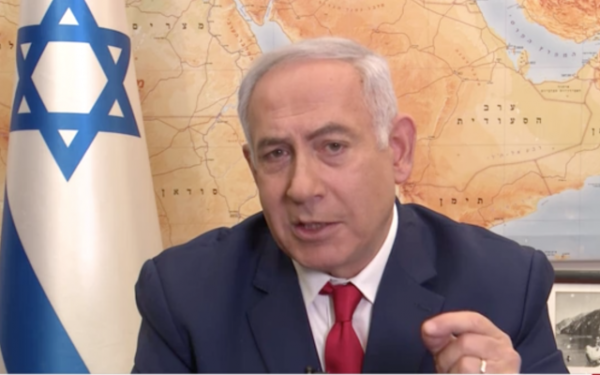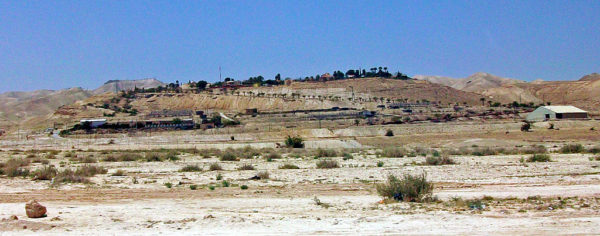Self- preservation defines Benjamin Netanyahu’s narrow approach to politics. It is what makes him tick as a politician. It is his end game.
Four years ago, fearing he might lose the general election, Netanyahu issued a last-minute warning to wavering right-wing voters that “droves” of Israeli Arabs were being bused to polling stations by leftist Jewish supporters. His comment was designed to leave the impression that Israel was in danger of falling into Arab hands. Netanyahu’s racist appeal worked, though he later apologized for it.

During this hotly-contested election campaign, he has used the same slimy tactic. He claims that his main challenger, Benny Gantz, the leader of the centrist Blue and White Party and the former commander of Israel’s armed forces, would “hand over parts of our homeland to the Arabs,” and that he would forge alliances with Israeli Arab parties that “want to destroy Israel.”
With the April 9 election just days away, Netanyahu’s cheap shot may yet convince right-of-center Israelis to vote for his Likud Party rather than for smaller right-wing parties.

Yesterday, in a significant move, Netanyahu resorted to another ploy to win the hearts and minds of this constituency. He promised to extend Israeli sovereignty over Jewish settlements in the West Bank. In effect, he delivered a promise to annex parts of the West Bank, thereby breaking with Israel’s endorsement of the land-for-peace formula under United Nations resolution 242 and ruling out the prospect of a two-state solution — the only practical, realistic and fair method of resolving Israel’s protracted conflict with the Palestinians.
Claiming that Palestinian statehood would “endanger our existence,” Netanyahu pledged to maintain Israeli security control over the West Bank, which is inhabited by about 2.8 million Palestinian Arabs and some 400,000 Jews.

He emphasized that his plan includes all Israeli settlements and outposts. “I don’t distinguish between settlement blocs and isolated settlements,” he noted. “From my perspective, each of those settlement points is Israeli. We have a responsibility (for them) as the government of Israel. I (won’t) uproot any, and I won’t transfer them to the sovereignty of the Palestinians.”
Netanyahu made this momentous announcement after disclosing he had told U.S. President Donald Trump he would not force “a single person” living in a West Bank settlement to leave.
And in a direct reference to the Golan Heights, which Israel conquered in the 1967 Six Day War, Netanyahu said, “There is a very important principle in international life. When you start wars of aggression, you lose territory, do not come and claim it afterwards. It belongs to us.” Elaborating on this argument, he added, “If occupied in a defensive war, then it’s ours.”
In all probability, Netanyahu was emboldened to stake out these positions following Trump’s formal recognition of Israel’s sovereignty over the Golan, which was annexed by Israel in 1981.
For several after his reelection in 2009, Netanyahu professed to support a two-state solution under certain conditions, but after Trump’s accession to the White House in 2016, he gradually withdrew his endorsement of a Palestinian state. Trump’s recognition of Jerusalem as Israel’s capital and his subsequent decision to transfer the U.S. embassy from Tel Aviv to Jerusalem only hardened Netanyahu’s objection to a two-state solution.

In reality, Netanyahu never paid more than mere lip service to that concept. He continually assured Jewish settlers in the West Bank that he was with them in every important respect and he continued to expand settlements. This was hardly surprising, given his own party’s consistent opposition to Palestinian statehood.
At most, Netanyahu is prepared to grant the Palestinians a measure of autonomy. Essentially, Netanyahu has decided that conflict management is preferable to conflict resolution, a policy that will haunt Israel for decades to come.
Netanyahu’s vow on April 6 to extend Israeli sovereignty to Jewish settlements in the West Bank, a euphemism for outright annexation, fits in with this grand strategy.
Should he win the forthcoming election and go through with his pledge, Netanyahu will set Israel on a perilous course toward a one-state solution, which would seriously exacerbate Israel’s dispute with the Palestinians and signal the end of its status as a democratic Jewish state.
Netanyahu recognizes that a one-state solution could very well result in the formation of a binational state, the solution of choice of hardline Palestinians who reject Israel’s legitimacy and existence. But if he remains true to his promise of extending Israeli sovereignty over settlements in the West Bank, Netanyahu will likely go down in history as the prime minister who planted the seeds of Israel’s destruction as a Jewish democracy.
Israeli voters should be aware of the dangers that await them under a new government headed by Netanyahu.
